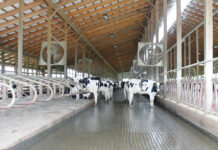RITTMAN, Ohio — The last 10 years have been a roller coaster for the dairy industry, Dianne Shoemaker, specialist in dairy production economics for Ohio State University Extension, told the crowd at a summit meeting before the Dairy Twilight Tour, in Rittman, Ohio, July 20.
Last year was no exception. Supply chain challenges and processing demand forced some farmers to dump milk early in the pandemic. And with milk production on the rise, exports have been the key to making sure that every year doesn’t look like 2020, Shoemaker said.
Challenges related to markets, environmental stewardship and policy continue to push the industry to adapt. The good news is, for farmers who manage their businesses well, there are still plenty of ways to be successful in dairy, she said.
Markets
In 10 years, Ohio has lost more than 1,000 dairy farms. The number of cows, however, has not gone down, since many of them moved to other farms as consolidation in the industry continued. Milk prices are the main driver for that trend, Shoemaker said.
“I’m not going to tell you what the milk price is going to be, because I learned long ago, you don’t try to anticipate what the milk price is going to be,” she said. And in the dairy industry, the responses for high prices and low prices are the same: milk more cows. So, even with less farms, milk production is going up.
“We have too many cows, and we have too much milk,” Shoemaker said. “And until that gets resolved, there is no magic fix for what the milk price is.”
There are few people who really understand the current milk pricing system. The current system was designed in the 1930s, mainly for local markets. Now, that market is international, and the system doesn’t fit today’s needs.
But it’s not easy to change. Farmers will need to be unified enough to agree on a federal order, Shoemaker said. She’s hoping this period of tough times for the industry can be a catalyst for meaningful change.
Sales
That’s why exports have been so essential for the dairy markets. Scott Higgins, chief executive officer of both the Ohio Dairy Producers Association and the American Dairy Association Mideast, said exports for dairy in 2020 were up 10% over 2019. Overall, 17.8% of dairy sales went to international markets. The check-off program’s goal is to up that to 20%.
“We’re trying to keep pace with your capacity to produce,” he said.
Dairy consumption is also up by about 7 pounds per capita, Higgins said. Working with schools and brands to keep and increase dairy on menus has been one factor in that. Restaurant sales went down 44% in 2020, but retail sales went up 57%, due to the pandemic’s impact.
Even with export markets and increases in dairy consumption, to stay in business over the next 10 years, farmers will probably need to be in the top third of dairy farms, Shoemaker said. Risk management and knowing a farm’s total cost of production are important parts of that.
Water quality
Markets aren’t the only current concern for dairy farmers. There’s also increasing consumer demand and concern for environmental stewardship, not just on dairy farms, but in all of agriculture.
At the summit meeting, Ohio Department of Agriculture Director Dorothy Pelanda gave an update about H2Ohio, the state’s water quality initiative. The program recently got another injection of nearly $52 million per year over the next two years from the state’s budget.
The department rolled out its program in 14 counties in the Western Lake Erie Basin in 2020, enrolling more than a million acres in its first year, and recently expanded to another 10 counties.
It’s still fairly early in the program, and scientists have noted it may take some time to see results. The department has a three to five year commitment to work with the farmers in the original 14 counties.
“We need to give farmers more time. We need to give the program more time,” Pelanda said.
Environmental stewardship
Gathering data to compare the dairy industry impacts on the environment and animal health to alternative milks and foods, and talking about the work farmers do to keep their environments healthy, is important for making the case that dairy is a good option, Higgins said.
“As the dairy industry, we’re very private,” he said. But consumers want to know more details about how their food is being produced. So the check-off is working on ways to gather data while protecting individual farmers’ information.
Communicating that data is also important. Higgins said millennials and Generation Z now hold a larger part of buying power in the U.S. The check-off has focused more heavily on outlets like social media than on traditional media, like television, to help reach younger people.
Taxes
Federal tax proposals have been a major policy topic for ag groups, especially a proposal to eliminate stepped-up basis. That means heirs to property and assets would have to pay taxes on increases in value on what they inherit.
The proposal exempts heirs who are actively farming, said Barry Ward, director of OSU Extension’s Income Tax School Program, but details of how the exemption would work aren’t clear yet.
“There’s probably going to be a lot of shenanigans going on to make an heir suddenly a farming heir, rather than a non-farming heir,” Ward said.
The proposal has drawn attention and pushback from many farming organizations. But Ward isn’t convinced that the proposal will pass. It’s part of the American Families Plan, which lawmakers are currently considering. Democratic lawmakers could pass legislation through reconciliation, but there are still moderates on both sides of the aisle, so he doesn’t think that’s likely.
“This is a pretty big change,” he said. “I think that there’s going to be enough that aren’t willing to make this giant leap in terms of changes to our tax code. Time will tell.”










